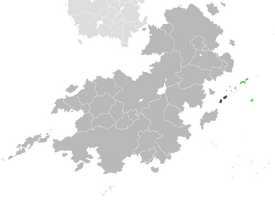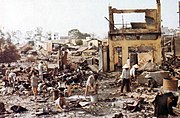South Kabu: Difference between revisions
mNo edit summary |
|||
| Line 164: | Line 164: | ||
[[File:ARVN Rangers defend Saigon, Tet Offensive.jpg|260px|thumb|left|ABRK soldiers defending Ayukarta during the attempted coup d'état]] | [[File:ARVN Rangers defend Saigon, Tet Offensive.jpg|260px|thumb|left|ABRK soldiers defending Ayukarta during the attempted coup d'état]] | ||
In 1984, a Masioran student shot and [[Assassination of Sutikno Harjo|killed Sutikno Harjo]]. The student was detained shortly afterwards trying to flee Ayukarta and was executed without a trial. Sutikno Harjo's assassination caused a period of political chaos within South Kabu. In 1986 an [[ | In 1984, a Masioran student shot and [[Assassination of Sutikno Harjo|killed Sutikno Harjo]]. The student was detained shortly afterwards trying to flee Ayukarta and was executed without a trial. Sutikno Harjo's assassination caused a period of political chaos within South Kabu. In 1986 an [[1986 South Kabuese coup d'état attempt|attempted coup]] left 132 dead and resulted in widespread purges of the armed forces and specifically the navy. As a result of the attempted coup d'état and the assassination of Sutikno Harjo a [[Negara Darurat|state of emergency]] was declared. Freedom of speech and expression were suspended indefinitely and thousands were arrested after a spy-ring was uncovered within the Foreign Affairs department. | ||
As a result of the mass arrests and crackdown on civil liberties, militant members of the LMKD and anti-BKMI groups formed an alliance and started launching [[Insurgency in South Kabu|attacks against the government]]. As of 2020 the insurgency has cost the lives of over 12,000 people. | As a result of the mass arrests and crackdown on civil liberties, militant members of the LMKD and anti-BKMI groups formed an alliance and started launching [[Insurgency in South Kabu|attacks against the government]]. As of 2020 the insurgency has cost the lives of over 12,000 people. | ||
In 2017 the South Kabuese government began to liberalise and certain parts of the Negara Darurat were ended. President [[Tirto Sutikno]] vowed to end the Negara Darurat in 2021 but was met with opposition from hardline factions among the BKMI. A planned referendum on ending the Negara Darurat was blocked by Premier [[Susilo Dwi]] who accused the President of listening to counter-revolutionaries in the government. | In 2017 the South Kabuese government began to liberalise and certain parts of the Negara Darurat were ended. President [[Tirto Sutikno]] vowed to end the Negara Darurat in 2021 but was met with opposition from hardline factions among the BKMI. A planned referendum on ending the Negara Darurat was blocked by Premier [[Susilo Dwi]] who accused the President of listening to counter-revolutionaries in the government. | ||
==Geography== | ==Geography== | ||
===Climate=== | ===Climate=== | ||
Revision as of 13:33, 12 May 2021
This article is incomplete because it is pending further input from participants, or it is a work-in-progress by one author. Please comment on this article's talk page to share your input, comments and questions. Note: To contribute to this article, you may need to seek help from the author(s) of this page. |
Socialist Republic of Kabu Republik Sosialis Wong Kabupik (Kabuese) | |
|---|---|
Motto: Persatuan, Merdika, Podo, Buruh Unity, Freedom, Equality, Labour | |
 Land controlled by South Kabu shown in dark green; land claimed but uncontrolled shown in light green. | |
| Capital and largest city | Ayukarta |
| Official languages | Kabuese |
| Recognised regional languages | Masiorese |
| Demonym(s) | Kabuese • North Kabuese |
| Government | Unitary Socialist Semi-Presidential Republic |
• President | Tirto Sutikno |
• Premier | Susilo Dwi |
| Legislature | People's Senate |
| Establishment | |
• Kabu Colony | 1797 |
• Treaty of TBD | 1947 |
• Negara Darurat | 1984 |
• Current Constitution | 1994 |
| Area | |
• | 44,154 km2 (17,048 sq mi) |
| Population | |
• 2018 census | 7,841,984 |
• Density | 178/km2 (461.0/sq mi) |
| GDP (PPP) | estimate |
• Total | $101.459 billion |
• Per capita | $12,938 |
| GDP (nominal) | 2019 estimate |
• Total | $45.271 billion |
• Per capita | $5,773 |
| Gini (2020) | 23.1 low |
| HDI (2020) | high |
| Driving side | right |
| Calling code | +62 |
| Internet TLD | .ku |
South Kabu (Kabuese: Kabupik Kidul), officially the Socialist Republic of Kabu (Kabuese: Republik Sosialis Wong Kabupik) is a country in Southeast Coius constituting the southern part of the Kabu Archipelago. The country shares a maritime border with North Kabu across the strait of TBD. Like it's Northern counterpart South Kabu claims the entirety of the Kabu Archipelago and the overseas territories of Kingsport and Nouvel Anglet of Estmere and Gaullica respectively.
The first human settlers arrived in what is now South Kabu at around 500AD. The earliest evidence of human settlements come from Yuwana. Primarily these settlements were found on the coast of inland near Paddy fields and Rice terraces which are prominent to this day in South Kabu. Through trade and contact with Dezevau the Badi religion was spread across the Kabu Archipelago becoming the dominant religion in the archipelago influencing centuries of Kabuese culture.
Various Kabuese Kingdoms and states existed throughout Kabuese history, the most prominent is the Kingdom of Kabu which existed from XXXX to XXXX and was governed from TBD. The Kingdom of Kabu managed to gain control over much of the Kabu Archipelago. The Kingdom was able to prosper due to the expanding Spice Trade in the area. As the Kingdom became rich from the Spice Trade and it's location, the city of Sulapangan was ceded to the Estmerish TBD (East India Company) as a trading port for primarily spices. The company's influence grew over the Kingdom eventually allowing the company to gain a monopoly on the Spice Trade in the Kabu archipelago.
The Carolinian Islands colony was officially created in 1797 with the Colonial administration being based in Ayukarta. Estmerish rule over the archipelago continued almost uninterrupted until the outbreak of the Great War when Gaullica invaded and occupied the colony. Following the invasion the Gaullican administration on the islands promised the natives independence if Gaullica won the war leading to a surge in anti-Estmerish and pro-independence sentiment on the islands.
Following the war, various pro-independence anti-colonial militia's were set up. The largest in the South was the National Liberation Front of Kabu which was a Socialist group which desired an independent, socialist Kabu similar to Kirenia. Tensions between the Socialists and Nationalists led to the beginning of the Kabu Civil War between the Socialists and Nationalists eventually culminating in a stalemate and a ceasefire under the Treaty of X. Following the war, militia leader Sutikno Harjo was elected President. Sutikno was assassinated in 1984 leading to the beginning of the Negara Darurat which still continues until today.
Today, South Kabu is seen as a developing country with a high HDI and low income inequality due to the Socialist economic system in the country which has been in place since the Kabu civil war. South Kabu has a fast growing economy although development has slowed slightly in recent years. South Kabu faces severe problems with Poverty, Corruption and ethnic tensions between the Kabuese Majority and the various minorities in the country. South Kabu is a member of the Association for International Socialism; the country has also established Diplomatic relations with TBD countries.
Etymology
History
Prehistory
Kingdoms of Kabu
Estmerish colonisation
Kabu civil war
- Gaullican occupation
- Failed attempt at a united government
- Battle of Ayukarta
- Course of the war
- Treaty of City
South Kabu and Negara Darurat
The Kabu War was devastating to South Kabu. X% of the entire South Kabuese population died in the war and Ayukarta was devastated by initial fighting and subsequent skirmishes and sabotage attempts. Sutikno Harjo was subsequently elected as President of the Socialist Republic of Kabu in 1948 and was influential in writing the country's constitution which claimed to be the constitution of the entire Kabuese Archipelago. In 1952, Sutikno Harjo formalised South Kabu's claims on Nouvel Anglet and Kingsport.
In 1958, Masioran separatists launched a series of attacks against government with covert aid from North Kabu. The attacks led to the deaths of several high ranking officials including the Premier. In response to this the province of Masiora was placed under martial law and a crackdown on civil liberties began in the area. The South Kabuese government was accused of ethnic cleansing by Masioran activists and members of the international community after forcefully expelling Masiorans and destroying several Masioran villages.
Further crackdowns on Masiorans began in 1969 after the murder of a civil servant in Kutha Harjo. The resulting crackdown resulted in the deaths of over 1000 Masiorans within two weeks, the mass campaign of arrests and executions was ended after condemnation from the international community. The crackdowns did little to quell the violence in Masiora and support for the Masioran league for Democracy grew at a rapid pace. The LMKD was banned in 1970 and it's leaders either went into exile or were arrested and executed.
In 1984, a Masioran student shot and killed Sutikno Harjo. The student was detained shortly afterwards trying to flee Ayukarta and was executed without a trial. Sutikno Harjo's assassination caused a period of political chaos within South Kabu. In 1986 an attempted coup left 132 dead and resulted in widespread purges of the armed forces and specifically the navy. As a result of the attempted coup d'état and the assassination of Sutikno Harjo a state of emergency was declared. Freedom of speech and expression were suspended indefinitely and thousands were arrested after a spy-ring was uncovered within the Foreign Affairs department.
As a result of the mass arrests and crackdown on civil liberties, militant members of the LMKD and anti-BKMI groups formed an alliance and started launching attacks against the government. As of 2020 the insurgency has cost the lives of over 12,000 people.
In 2017 the South Kabuese government began to liberalise and certain parts of the Negara Darurat were ended. President Tirto Sutikno vowed to end the Negara Darurat in 2021 but was met with opposition from hardline factions among the BKMI. A planned referendum on ending the Negara Darurat was blocked by Premier Susilo Dwi who accused the President of listening to counter-revolutionaries in the government.



